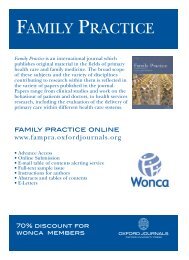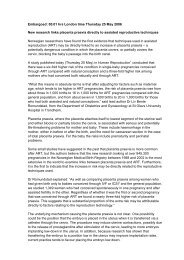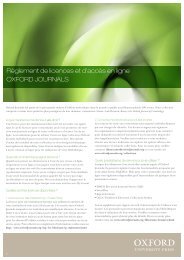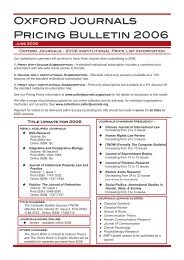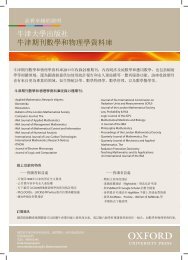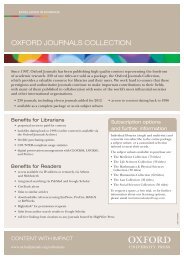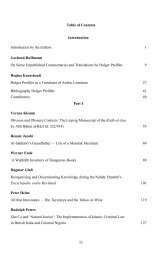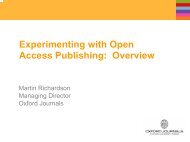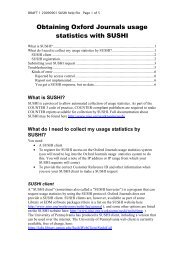- Page 1 and 2:
Annals of Oncology www.annonc.oxfor
- Page 3 and 4:
subscriptions A subscription to Ann
- Page 6 and 7:
Annals of Oncology Official Journal
- Page 8 and 9:
The European Society for Medical On
- Page 10 and 11:
Audit Committee Chair: Fortunato Ci
- Page 12 and 13:
Familial cancer Judith Balmaña, Ba
- Page 14 and 15:
ESMO 2012 Congress Travel Grants 47
- Page 16 and 17:
Exhibitors The following companies
- Page 18 and 19:
ESMO Fellowships, 1989-2011 The Eur
- Page 20:
Ondrej Gojis, Czech Republic 2008-2
- Page 23 and 24:
abstracts hpv biology and implicati
- Page 25 and 26:
abstracts the characterization of l
- Page 27 and 28:
abstracts description of intra-tumo
- Page 29 and 30:
prevent cell death. It is anticipat
- Page 31 and 32:
22IN TARGETING THE HOST IN TNBC G.
- Page 33 and 34:
abstracts a paradigm shift in early
- Page 35 and 36:
abstracts how can medical oncologis
- Page 37 and 38:
feasibility), but by how high the c
- Page 39 and 40:
abstracts re-inventing the medical
- Page 41 and 42:
abstracts emerging diagnostic and t
- Page 43 and 44:
abstracts biologically based treatm
- Page 45 and 46:
abstracts molecular targets in mali
- Page 47 and 48:
abstracts melanoma therapy: from fr
- Page 49 and 50:
diagnosis and can also be used for
- Page 51 and 52:
analysis at 11 months median follow
- Page 53 and 54:
mouse model of Kras mutant NSCLC. I
- Page 55 and 56:
abstracts subtyping soft tissue sar
- Page 57 and 58:
abstracts key topics in supportive
- Page 59 and 60:
ESMO-CSCO Joint Symposium: Building
- Page 61 and 62:
ESMO-EANM-ESR Joint Symposium: Imag
- Page 63 and 64:
ESMO-ESTRO Joint Symposium: Innovat
- Page 65 and 66:
ESMO-MASCC Joint Symposium: Integra
- Page 67 and 68:
ESO Society Symposium: Celebrating
- Page 69 and 70:
Results: TIMP-1 expression was incr
- Page 71 and 72:
will benefit from this targeted the
- Page 73 and 74:
cytomegalovirus (CMV). Analysis of
- Page 75 and 76:
functional consequences of Endoglin
- Page 77 and 78:
elationship between the ROR score,
- Page 79 and 80:
183P EPIDERMAL GROWTH FACTOR RECEPT
- Page 81 and 82:
Plasma adiponectin level on the pre
- Page 83 and 84:
Table: 198P PFS OS Median, mo HR Me
- Page 85 and 86:
204P EVALUATION OF PTEN AND PIK3CA
- Page 87 and 88:
Material and methods: We searched P
- Page 89 and 90:
Results: The median concentration o
- Page 91 and 92:
Table: 226P Methods: Pts were rando
- Page 93 and 94:
However, additional analysis sugges
- Page 95 and 96:
number of biomarkers have been trie
- Page 97 and 98:
Table: 248O 249PD PROTEOMIC PREDICT
- Page 99 and 100:
Conclusions: BW and serum Ctrough o
- Page 101 and 102:
261P BREAST CANCER SUBTYPES AND OUT
- Page 103 and 104:
90 mg/m2-cyclophophamide 600 mg/m2
- Page 105 and 106:
to 9 weeks after dosing. Trastuzuma
- Page 107 and 108:
Patients and methods: We reviewed d
- Page 109 and 110:
sector patients. The aim of this st
- Page 111 and 112:
Linear Logistic Model with Relaxed
- Page 113 and 114:
Results: The median CTC fold change
- Page 115 and 116:
312: Table: Chemotherapy uptake wit
- Page 117 and 118:
abstracts breast cancer, locally ad
- Page 119 and 120:
Results: 8 trials (2092 pts) with 1
- Page 121 and 122:
absolute difference of median value
- Page 123 and 124:
Novartis, Genentech, and sanofi-ave
- Page 125 and 126:
Results: Three RCTs with 1023 patie
- Page 127 and 128:
collected from all patients for det
- Page 129 and 130:
355P FIRST REPORT OF LONG-TERM RESP
- Page 131 and 132:
361P A RETROSPECTIVE ANALYSIS OF PL
- Page 133 and 134:
publications and aggregated in a me
- Page 135 and 136:
Thus the primary aim to target BCSC
- Page 137 and 138:
383 WHY DO WOMEN WITH BREAST CANCER
- Page 139 and 140:
Results: We evaluated 76 pts with M
- Page 141 and 142:
more than 6 cycles of capecitabine.
- Page 143 and 144:
406TiP PHASE II TRIAL OF PRIMARY SY
- Page 145 and 146:
abstracts CNS tumors 410O CONDITION
- Page 147 and 148:
Conclusions: Our data suggested tha
- Page 149 and 150:
Conclusions: As in other cancer typ
- Page 151 and 152:
432 GAMMA KNIFE RADIOSURGERY AS A M
- Page 153 and 154:
abstracts developmental therapeutic
- Page 155 and 156:
1PR), but no responses were seen in
- Page 157 and 158:
RO and Cd, as well as PD data for c
- Page 159 and 160:
and vulvar Ca), and 11 SDs were obs
- Page 161 and 162:
knowing HLA-A status double-blindly
- Page 163 and 164:
Acquired-resistance to EGFR inhibit
- Page 165 and 166:
474P PHASE 1 STUDY OF THE SELECTIVE
- Page 167 and 168:
TST is active in breast and gastric
- Page 169 and 170:
Treatment-induced shedding of circu
- Page 171 and 172:
Methods: Either co-cultures of peri
- Page 173 and 174:
501 PRECLINICAL DATA INVESTIGATING
- Page 175 and 176:
509TiP LUX-LUNG 8: A RANDOMIZED, OP
- Page 177 and 178:
(P = 0.64). Synchronous BBC was sig
- Page 179 and 180:
abstracts gastrointestinal tumors,
- Page 181 and 182:
Disclosure: M. Lee: I am an employe
- Page 183 and 184:
plus intravenous Bev(7.5mg/kg q 21d
- Page 185 and 186:
anti-EGFR treatment. The present st
- Page 187 and 188:
patients harboring a T/T genotype t
- Page 189 and 190:
551P ADJUVANT CHEMOTHERAPY (AC) USE
- Page 191 and 192:
experienced significantly more ≥
- Page 193 and 194:
functioning scales. Exploratory ana
- Page 195 and 196:
oxaliplatin (100 mg/m 2 )/raltitrex
- Page 197 and 198:
572P PANERB STUDY: WHICH CATEGORY O
- Page 199 and 200:
Results: 92/114 patients were preop
- Page 201 and 202:
585P CHANGES IN THE INTESTINAL ENVI
- Page 203 and 204:
592P PHASE II TRIAL OF COMBINED CHE
- Page 205 and 206:
minutes. In a previous study, 30-mi
- Page 207 and 208:
Patients and methods: Chemotherapy-
- Page 209 and 210:
612P ARE PATIENTS WITH RESECTABLE R
- Page 211 and 212:
Conclusions: AMPK and ACC activatio
- Page 213 and 214:
of surgical monotherapy in patients
- Page 215 and 216:
Table: 632 633 AFLIBERCEPT/FOLFIRI
- Page 217 and 218:
factors play the determining role i
- Page 219 and 220:
Abstract withdrawn in exceptional c
- Page 221 and 222:
were respectively 10.6 vs 8.5 vs 3.
- Page 223 and 224:
Results: 20 gastrointestinal cancer
- Page 225 and 226:
abstracts gastrointestinal tumors,
- Page 227 and 228:
Day 8. A second identical course wa
- Page 229 and 230:
proven in stage I GC. The aim of th
- Page 231 and 232:
Conclusions: Longer OS to FOLFOX wa
- Page 233 and 234:
692P PRELIMINARY SAFETY DATA FROM A
- Page 235 and 236:
subgroup. Taking into consideration
- Page 237 and 238:
Results: Three years of adjuvant im
- Page 239 and 240:
considered sufficient to give an 80
- Page 241 and 242:
721P FIRST-LINE TREATMENT WITH FOLF
- Page 243 and 244:
after Gem-based therapy. The additi
- Page 245 and 246:
735P RADIOGRAPHIC PARAMETERS IN PRE
- Page 247 and 248:
validate the revised AJCC 7th stagi
- Page 249 and 250:
Results: Among 862 MM we identified
- Page 251 and 252:
Results: Frequently reported advers
- Page 253 and 254:
gastric cancer patients with CNS me
- Page 255 and 256:
discriminate the prognosis of HCC p
- Page 257 and 258:
prospective, non-interventional stu
- Page 259 and 260:
abstracts genitourinary tumors, non
- Page 261 and 262:
787O EXTERNAL VALIDATION OF THE ASS
- Page 263 and 264:
patient preference for P over S, an
- Page 265 and 266:
798PD OPEN-LABEL PHASE II TRIAL OF
- Page 267 and 268:
Hb, PS and LM. Median PFS for patie
- Page 269 and 270:
may have led to reduced dose and sh
- Page 271 and 272:
Results: 1,622 patients were identi
- Page 273 and 274:
RCC) was designed to address an unm
- Page 275 and 276:
Patients and methods: This is a sin
- Page 277 and 278:
treatment at week 4, and week 12 by
- Page 279 and 280:
effective in second or further line
- Page 281 and 282:
Conclusions: In pts with RCC treate
- Page 283 and 284:
using Drug inCode ® pharmacogeneti
- Page 285 and 286:
Table: 857P standard, but is not av
- Page 287 and 288:
efused HDCT. Of 23 patients, 20 com
- Page 289 and 290:
we identified 49 and 220 patients w
- Page 291 and 292:
879 TREATMENT OF PATIENTS WITH META
- Page 293 and 294:
Median overall survival (OS) was 26
- Page 295 and 296:
abstracts Genitourinary tumors, pro
- Page 297 and 298:
and week 13 BPI-SF Q3 scores), 28%
- Page 299 and 300:
Working Group (PCWG)-2 guidelines r
- Page 301 and 302:
atio HR 0.39; CI 0.18, 0.83, p = 0.
- Page 303 and 304:
We observed tumor responses and pro
- Page 305 and 306:
Here we report emerging data from t
- Page 307 and 308:
928P LHRH AGONIST-INDUCED SUPPRESSI
- Page 309 and 310:
Disclosure: S. Oudard: Has acted as
- Page 311 and 312:
939P NEOADJUVANT SIPULEUCEL-T IN LO
- Page 313 and 314:
945 BONE TURNOVER MARKERS AND POTEN
- Page 315 and 316:
952 SEQUENTIAL ANDROGEN DEPRIVATION
- Page 317 and 318:
managed in a multidisciplinary (MD)
- Page 319 and 320:
or hypercalcemia at screening; prio
- Page 321 and 322: meeting. The prevalence of LGSC is
- Page 323 and 324: Table: 975PD Continued AMG 386 + pa
- Page 325 and 326: physicians in the U.S. and Europe.
- Page 327 and 328: 989P PHASE II STUDY OF COMBINATION
- Page 329 and 330: elated with stage, nodal involvemen
- Page 331 and 332: 1004P CASE CONTROL STUDY ON TWO DIF
- Page 333 and 334: eight patients who had infertility
- Page 335 and 336: abstracts head and neck cancer 1016
- Page 337 and 338: same CT/RT; Arm B2: 3 cycles of ind
- Page 339 and 340: induction chemotherapy in the treat
- Page 341 and 342: patients. We have developed a rando
- Page 343 and 344: evaluated by the screening instrume
- Page 345 and 346: morbidities that radiation would le
- Page 347 and 348: Conclusions: Through adequate selec
- Page 349 and 350: abstracts hematological malignancie
- Page 351 and 352: anthracyclines in vitro. A favorabl
- Page 353 and 354: 1076P RITUXIMAB PLUS SUBCUTANEOUS C
- Page 355 and 356: than the standard target of ≥2.5
- Page 357 and 358: Patients: From November 2002 to May
- Page 359 and 360: lymphadenopathy and multiple cutane
- Page 361 and 362: prospective non-interventional stud
- Page 363 and 364: Funding: GSK Biologicals Disclosure
- Page 365 and 366: survival rates of 13-25% (Prieto et
- Page 367 and 368: high response rates and prolonged p
- Page 369 and 370: GlaxoSmithKline, Merck Sharp & Dohm
- Page 371: advisor for Merck Sharp & Dohme, an
- Page 375 and 376: systemic therapy or were intolerant
- Page 377 and 378: abstracts neuroendocrine tumors and
- Page 379 and 380: morbidity, with G3 tumors behaving
- Page 381 and 382: pts. Poorly differentiated endocrin
- Page 383 and 384: Adenocarcinoma was present in 25 pa
- Page 385 and 386: Method: Endobronchial ultrasound gu
- Page 387 and 388: widely used by single agent or plat
- Page 389 and 390: disease after surgery were treated
- Page 391 and 392: stage IIIA NSCLC, EML4-ALK fusion-p
- Page 393 and 394: 1200P CONCOMITANT CHEMORADIATION GI
- Page 395 and 396: Patients and methods: The study was
- Page 397 and 398: months (95% CI:13-25). The PFS and
- Page 399 and 400: maintenance therapy had favourable
- Page 401 and 402: abstracts non-small cell lung cance
- Page 403 and 404: Ingelheim, GSK Biologicals (compens
- Page 405 and 406: 1234PD RANDOMIZED PHASE III TRIAL O
- Page 407 and 408: GlaxoSmithKline (myself, compensate
- Page 409 and 410: 1243P IDENTIFICATION OF MICRORNA (M
- Page 411 and 412: N-arm n=34 P-arm n=32 All n=66 Male
- Page 413 and 414: 1255P POPULATION BASED EVALUATION O
- Page 415 and 416: 1262P DISTINCT SPREAD OF EGFR MUTAT
- Page 417 and 418: 1268P VISUAL DISTURBANCES IN PATIEN
- Page 419 and 420: MERCK SERONO: Advisor, speaker in s
- Page 421 and 422: Conclusions: These data from SAiL a
- Page 423 and 424:
NSCLC diagnosis and time of BM diag
- Page 425 and 426:
1291P PHASE I/II DOSE-FINDING STUDY
- Page 427 and 428:
Network utilization of WBCGF in the
- Page 429 and 430:
1303P COST EFFECTIVENESS OF PEMETRE
- Page 431 and 432:
Results: The patients’ characteri
- Page 433 and 434:
EGFR mut at exons 18, 19, 21, and K
- Page 435 and 436:
Methods: EML4-ALK fusion was screen
- Page 437 and 438:
Results: The median survival time (
- Page 439 and 440:
enefit from sustained EGFR blockade
- Page 441 and 442:
epresented by 19 pts (32%) female,
- Page 443 and 444:
and at least one prior course of ch
- Page 445 and 446:
Methods: NSCLC patients with radiog
- Page 447 and 448:
1367TiP LONG-TERM ERLOTINIB THERAPY
- Page 449 and 450:
Austria, Czech Republic, Finland, G
- Page 451 and 452:
were every 6 weeks (wk) (S1), every
- Page 453 and 454:
Advantage enrollees (83% vs. 25%) [
- Page 455 and 456:
Results: Based on 10,000 simulation
- Page 457 and 458:
cancer tumors 12%, Germ cell tumor
- Page 459 and 460:
Material and methods: 50 lung cance
- Page 461 and 462:
1414TiP IMPLEMENTATION OF CANCER RE
- Page 463 and 464:
abstracts palliative care 1422O EFF
- Page 465 and 466:
Method and results: A total of 317
- Page 467 and 468:
1436P SURVEY ON MODELS OF INTEGRATI
- Page 469 and 470:
care unit (PCU) at the National Can
- Page 471 and 472:
Characteristic No. % Total 63 1 st
- Page 473 and 474:
hysterectomised-9.10% and cervix ca
- Page 475 and 476:
abstracts psycho-oncology 1462PD IN
- Page 477 and 478:
events, tumour response, and surviv
- Page 479 and 480:
abstracts sarcoma 1477O ADHESION TO
- Page 481 and 482:
1481PD A PHASE II STUDY OF DOVITINI
- Page 483 and 484:
1488P ORGANISATION OF SARCOMA PATIE
- Page 485 and 486:
Patients and methods: From August 2
- Page 487 and 488:
chemotherapy respectively. At a med
- Page 489 and 490:
of this group Those with relapsed d
- Page 491 and 492:
1515 PREDICTORS OF SURVIVAL IN ADOL
- Page 493 and 494:
abstracts small cell lung cancer an
- Page 495 and 496:
emaining receiving either CAV or to
- Page 497 and 498:
1533P EXPRESSION OF WILM⍰TUMOUR G
- Page 499 and 500:
more than 3 months after first line
- Page 501 and 502:
lower recurrence rate of NE. Pegfil
- Page 503 and 504:
egimens (HR = 2.5, p < 0.001). Phys
- Page 505 and 506:
1561P PREDICTIVE DIAGNOSTICS FOR RE
- Page 507 and 508:
Methods: A prospective multicentre
- Page 509 and 510:
Table: 1574P Pharmacokinetic parame
- Page 511 and 512:
Novartis and unrestricted research
- Page 513 and 514:
studies have shown that chemotherap
- Page 515 and 516:
(Grade 1) and moderate to severe (G
- Page 517 and 518:
declined to relatively lower level
- Page 519 and 520:
1609P PHYSICAL ACTIVITY (PA) AND PH
- Page 521 and 522:
patients were admitted to the oncol
- Page 523 and 524:
Dicarbamin 100 mg/day on day 5 befo
- Page 525 and 526:
Results: Anemia was detected in 83.
- Page 527 and 528:
important to carry out randomized s
- Page 529 and 530:
abstracts translational research 16
- Page 531 and 532:
expression. Then, we analyzed PB sa
- Page 533 and 534:
Table: 1657P TH BV + TH HR (95% CI)
- Page 535 and 536:
BRAF mutations. Circulating free DN
- Page 537 and 538:
1671P PHASE I CLINICAL TRIAL OF CAN
- Page 539 and 540:
1678P PREDICTIVE VALUE OF TWO PHENO
- Page 541 and 542:
theorized that the PI3K/AKT pathway
- Page 543 and 544:
Material and methods: 101 patients
- Page 545 and 546:
overexpressing and 232 had triple n
- Page 547 and 548:
author index author index A Aamdal
- Page 549 and 550:
author index Badran A. ix288 (874)
- Page 551 and 552:
author index Bösmüller H. ix209 (
- Page 553 and 554:
author index Chen A. ix319 (966O) C
- Page 555 and 556:
author index De Droogh E. ix452 (13
- Page 557 and 558:
author index Esposito G. ix209 (618
- Page 559 and 560:
author index Geiges G. ix306 (930P)
- Page 561 and 562:
author index Hartono S. ix70 (155P)
- Page 563 and 564:
author index Iwasaki H. ix542 (1694
- Page 565 and 566:
author index Kodaira M. ix90 (228P)
- Page 567 and 568:
author index Lichtensztejn D. ix350
- Page 569 and 570:
author index Martinez A. ix496 (153
- Page 571 and 572:
author index Morishita N. ix432 (13
- Page 573 and 574:
author index Okamoto N. ix432 (1320
- Page 575 and 576:
author index Piau S. ix456 (1401P)
- Page 577 and 578:
author index Rodríguez Rodríguez
- Page 579 and 580:
author index Scoggins C.R. ix371 (1
- Page 581 and 582:
author index Stern L. ix272 (823P)
- Page 583 and 584:
author index Trypaki M. ix429 (1308
- Page 585 and 586:
author index Whitmore J.B. ix310 (9
- Page 587 and 588:
subject index subject index A AAV-H
- Page 589 and 590:
subject index ix115 (316TiP), ix116
- Page 591 and 592:
subject index diffuse large B-cell
- Page 593 and 594:
subject index (1033P), ix340 (1036P
- Page 595 and 596:
subject index medical information,
- Page 597 and 598:
subject index (612P), ix214 (633),
- Page 599 and 600:
subject index RCC, ix274 (830P) re-
- Page 601 and 602:
subject index TR-FRET, ix84 (206P)
- Page 603 and 604:
drug index drug index 1248P, 1250P,
- Page 605 and 606:
translational research index transl
- Page 607 and 608:
translational research index transl
- Page 609:
translational research index transl



